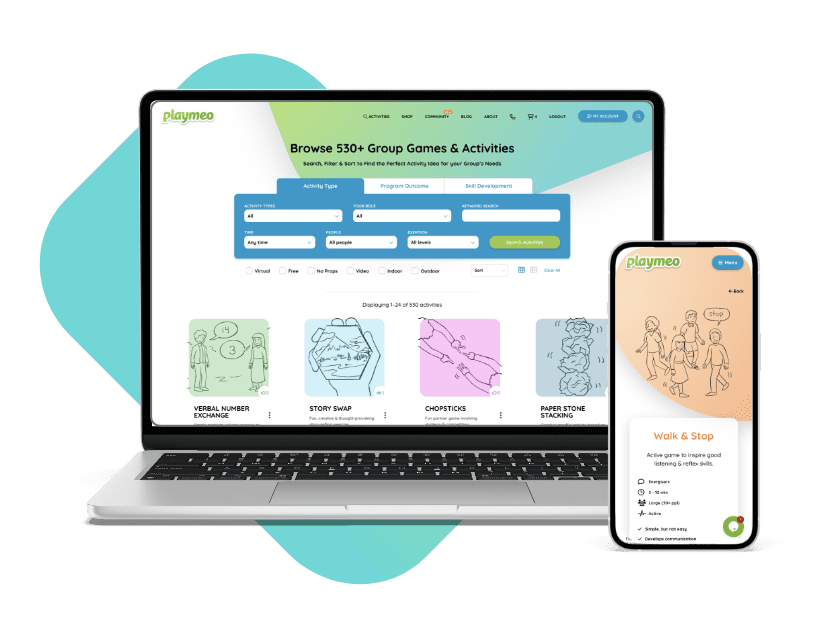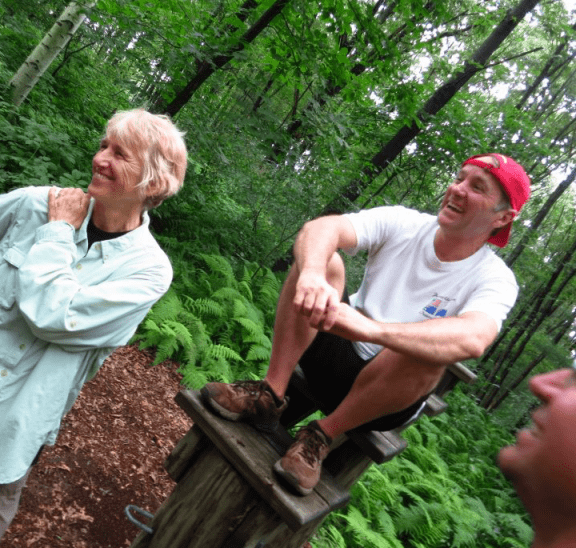One of the most vivid memories that many participants of a challenge ropes course report are their experiences with the Trust Fall activity.
The Trust Fall often sits at the pinnacle of a sequence of activities because it’s dramatic, thrilling and absolutely packed with lots of perceived (and actual) risk.
To this end, it is perfectly suited for many adventure programs. Indeed, it has featured heavily in many of my programs for more than 30 years, happily without incident or harm.
What’s In A Name?
In one of these programs, during my early years of leadership, a participant stopped me soon after I had briefed the activity to challenge me. He argued that by labelling the experience with “trust” there was an implication that upon completing the exercise, the level of trust within the group would be enhanced. In effect, he wanted to know if this would happen?
Of course, I was unable to guarantee any outcome so it got me thinking.
I was troubled by the fact that the label Trust Fall in effect telegraphed a particular outcome, and in the context of an adventure program, this was not a good fit. It cut across the grain of what I believed to be true.
Following conversations with a number of my colleagues, I then started to adopt the term Fall from Height because this label did not fall into the same trap of promising an outcome that may not be achieved. In a world in which you cannot escape gravity, I could (at least) guarantee that someone would indeed fall (safely) from height.
Now – let me be very clear here – I’m not necessarily advocating a name change. There is great value in continuing to refer to this classic group initiative by its original name for database and training purposes. I know I do.
But, let’s not excuse this convenience for missing a useful teachable moment.
Unanticipated Outcomes
From a very early point in my career, I clearly understood that “adventure” is best defined as an unanticipated outcome rather than by any particular adventure activity.
In some ways, preserving the adventure has become a mantra of mine because I believe in its power to transform groups and individuals.
To this end, anything that strikes at the heart of adventure – or choice or full value, for that matter – causes me to pause. When facilitated well, there is such power in discovery, especially when it is internally motivated and experienced within a positive learning environment.
And this is why, typically, I do not refer to the Trust Fall by its name when working with groups.
To be fair, I rarely ever introduce or brief an activity by its name a la “Okay, we’re now going to play….” because (a) my group does not care what I call the game, they only care how it will impact them and (b) there is a chance that some names inadvertently telegraph the purpose/outcome/surprise of the activity.
And I know I’m not alone because a quick enquiry among dozens of fellow educators (via the Interactive Group Games & Activities Facebook Group) confirms that many of us choose often not to label any experience by its name, perhaps for the same reasons.
As Shakespeare once wrote, “a rose by any other name would smell as sweet.”
In essence, everything is created in language (I speak more about this here.)
Further Applications
I want to close by pondering how this insight could be applied to other areas of facilitation and program design.
Here are three quick ideas:
- Invitation to participate – for a long time I have embraced the term “invite” when asking people to engage. The phrase “I invite you to …” always lands more powerfully for people than hearing the words “You must ….” or “You will…” In this way, I can honour choice and agency, two very powerful tools to equip any group involved in an adventure program.
- The art of possibility – I am careful not to say or demonstrate anything that may limit the possibilities of any experience. For example, I do not say that it is necessary for two people to clasp hands in order to successfully complete an exercise (eg Wild Woosey) – I will simply refer to the fact that the pair must have some form of “physical connection” which leaves open the option for so many more possible connections.
- Can’t or Won’t? – I will sometimes challenge individuals or groups when they say they cannot do something to help them explore if they can not or will not. When you explore what’s really going on, you open your group to what is truly possible and not excuse their unwillingness on something they actually control.
Trust Fall or Fall from Height? To-MAY-to or To-MAR-to?
What do you think? Do you agree, or can you offer another perspective?
Please share in the Comments below.

No Props? No Problem!
Get 150+ no-prop games & activities + exclusive 30-day free trial of playmeo. Scan QR codes to view activity videos, leadership tips, etc.

EMOJI Feeling Cards
50+ cards that portray a range of emotions from happy, sad, angry & confused. Ideal for building emotional literacy skills.

Wow, you’ve been busy!
You can open 1 more
activity for free.
Limit resets every 24 hours
or click below to get unlimited access.











graciaaaaas for this mark.
proud member of the OTC here! (“,)
i know i am over thinking when…..
1) i can not categorise the ideas into 3 connected areas
2) i find it difficult to explain my thought process to another person
3) i can not make a decision in an hour, after i go through a range of scenarios (especially when i am thinking of ‘novel’ ways to do games/activities)
i wonderrrrr – what are the other ways we experience ‘over thinking’?
😉
My first response to your question JeWElle is when we are stressed. The process of ‘over thinking’ may manifest when someone is under stress because they are fully immersed in the ‘story’ of what’s going on rather than the ‘what actually happened.’
I think the thought process is appropriate for us as facilitators. I certainly understand and agree with your thought process.
The purpose of the game is to kind of test whether they trust or not. I think the name is more for me than for them. I almost never mention the name of the game unless asked specifically so that they can play again. The kids definitely have their favorites. Adults overthink way too much!
I hear you Melinda, but I’m not sure the purpose of the TF is to ‘test’ the group. In the context that it is a challenge, then yes it is a ‘test’ but it’s not a test in the sense that it is a pass or fail exercise. I can think of a group that ‘dropped’ a faller once and the conversation that followed probably galvanised more trust in the group than if every faller was caught. And yes, I do think we adults over-think this stuff sometimes, ie I can be guilty of this too.
The “group fall” is always at the end of our semester. I think I hear that phrase ” I don’t trust anybody” is because of the middle school mentality. Middle level learners are often worried way more about what is going on beside them and around them than the actually event or point of the initiative. Framing the initiative is even more important at this level. Also the Challenge by Choice mantra also helps.
I agree with the naming issue. As a middle school teacher, I hear ” I don’t trust these people”. I assure them that all they need to trust in “ME”…..the instructor. As I am the one making sure all is well and the class is able to perform the task. This usually eases the apprehension of the task. So I will try the “group fall” next time.
Thanks for your thoughts, Paul. My quick response is that if you’re getting a lot of “I don’t trust these people” in your group, you may need to focus on a LOT more introductory group activities and trust exercises long before the high-level adventure of the Trust Fall, or whatever you call it. The TF ain’t going to fix that issue, rather a prolonged campaign of opportunities for your group to connect with one another more meaningfully first.
so… would it be inappropriate to re-tittle this activity “Catch me if you can!”?
I just had to blurt this out –
i think this is coooool! let’s keep the name options flowing? (“,)
Like you Mark, I rarely ever share the name of an activity with a group. There is so much to say about this activity and I think it’s name has caused many problems/challenges/assumptions over the years. Perhaps the name Group Catch would be a good one to use.
I think the activity does instill a certain type of trust within a group – specifically that I trust you all will catch me when you say you will. This would likely translate well to rock climbing or working together to load/unload canoes or some other physically risky group activity. Does this mean we’ve developed enough trust to be emotionally open and highly vulnerable with each other, maybe, maybe not. Depends on what else has happened in the group.
Thanks for the comment, Amy. As I say, I think the key is how we prepare or frame our group’s experience. Anything that may infringe the ‘adventure’ will only weaken our ability to facilitate transformation.
indeeeeed! i think, especially for this one – framing is everything. for me, this includes 3 things:
1) setting up safety/security features/measures,
2). preparing for a range of scenarios, particularly vulnerability
3) combining trust fall with deeper debriefing process and/or other reinforcing games/activities